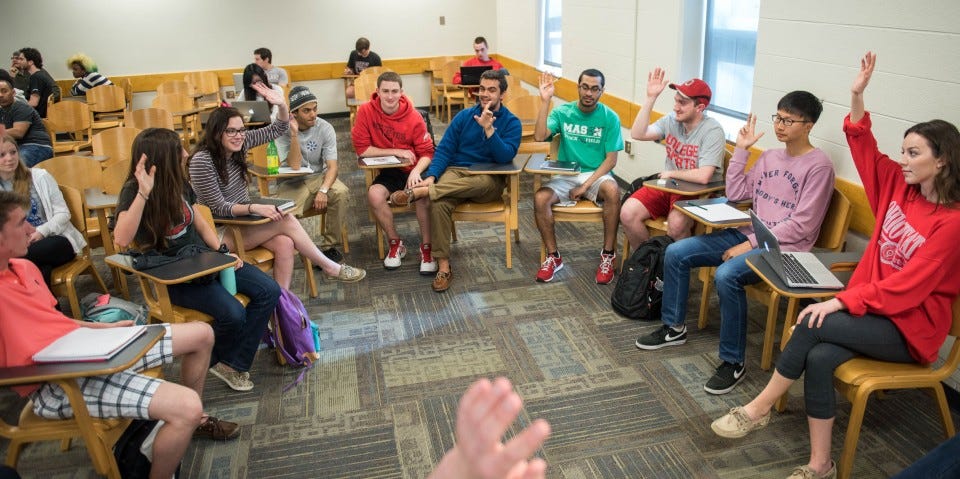The question was born out of desperation. I don’t remember the circumstances in the classroom that prompted me to ask it, except that for some reason there was way too much time left in the class period, and I had nothing even remotely academic for my students to work on. Maybe the in-class assignment had taken up significantly less time than I had allotted, and I didn’t have a follow up activity ready. Or maybe I had lost the assignment sheets in my cluttered classroom, and I couldn’t teach the lesson without them. It’s also entirely possible that the school’s internet had gone down, and spending the period in the computer lab doing research was then out of the question, necessitating a switch to plan B. Only there was no plan B. Every high school teacher, I’m sure, has known the feeling of impending doom if he doesn’t quickly find something meaningful for a classroom full of restless teenagers to do. So apropos of nothing I asked the question.
What followed was a terrific class discussion. From the get-go it was obvious that I had stumbled upon a topic that not only filled the time, but instantly engaged and energized my students. I had broached a subject in which all of them were experts, about which all of them had something meaningful to say. I simply had asked them how to raise a teenager. The response was, to say the least, energetic. Clearly, my English 11 students needed to vent.
The question wasn’t as random as it may sound. I was a young father at the time, and my students knew that my oldest son was close to approaching middle school age. In fact, I may have had current or future babysitters in that class. (A perk of being a high school teacher, by the way, is the opportunity to choose your babysitters from the cream of the crop.) Anyway, the discussion took off, and for the rest of the period the teacher delighted in, not to mention benefited from, being the student. I knew then that this would be a recurring topic in my classroom throughout my career, and eventually I turned the question into a writing assignment (the process paper). Initially, what my students said about raising teenagers was a revelation to me. As the years went by, however, I pretty much could predict what they were going to say.
Many of the suggestions were case specific. There was, for example, no consensus whatsoever on the issue of regulating or restricting social media and screen time in general. Also, birth order determined much of what a student had to say about parenting a teenager. Nonetheless, from these discussions emerged a set of far-from- comprehensive guidelines agreed upon by a large majority of students. Here are the ones that I remember along with some commentary. Take them for what they’re worth.
1.) Allow us to fail: All of my classes emphatically put this one at the top of the list. Failure, teenagers seem to intuitively understand, is a great teacher, and if parents insist on always coming to the rescue, then what’s there to learn? Students admitted to possible exceptions, and put it squarely on the shoulders of the parents to figure out when and how to intervene.
2.) Find the right leash length: The students whose parents were too strict longed for more freedom. The students whose parents set them free longed for more structure. So, clearly, it’s the parents' responsibility to impose a leash length that is not too short, not too long, but just right.
3.) Honor our emotions: “It’s just a phase.” “You’re young.” “Everyone goes through this.” Even if a parent means well, even if a parent has “been there,” statements such as these come across as dismissive or condescending. More often than not, my students said, a parent should just listen.
4.) If you haven’t been our friend from the beginning, don’t make the attempt now: Enough said.
5) Guilt trips are the most effective punishments: If a parent has been a friend from the beginning, then there is no punishment–not grounding, not scolding, not the revoking of privileges–more devastating, therefore more effective, than the words I’m disappointed in you.
6.) We don’t need to be reminded that our grades suck: Even though many high schoolers may speak cavalierly about grades, the truth is that for most students grades are a constant and often debilitating source of stress, and a bad report card, or even a single bad grade, weighs heavily upon their conscience. Ideally, a parent finds a way to communicate their concerns without compounding the stress.
7.) Understand that we are not the same person at home as we are at school: At Back-to-School Nights parents would often approach me to discuss their son or daughter. For some of them it was more than a little bewildering to hear me praising their student as a delightful and responsible young adult when the child they knew at home was a surly and lazy brat. During the school day, I can tell you, teenagers expend so much energy holding it all together–academically, physically, socially, emotionally–that once they get home, there is simply nothing left in the tank. They’ve given all they have to give, and so it is that during the school year parents don’t often get to see them when they’re at the top of their game.
Admittedly, these were all one-sided conversations, and parents would’ve had a thing or two to say on their behalf had they been given the opportunity. It’s also important to understand that these are the naturally self-centered views of adolescents who were attempting, maybe for the first time, to put themselves in their parents’ place. Most students, I’m happy to report, grudgingly admitted, or at least implied, that raising a teenager was a tough, tough job. They could freely make this admission to their English teacher. But to Mom and Dad? Not so freely.







Great insight
Great topic Mike. It made me think back to being the age of your students, and realized how much I forgot during the transition from student to parent. I’m sure I would have benefited, having students to remind me of how I may have felt back then.